
Rachel Cline’s The Question Authority is published this week. She shares five books in which the past is a foreign country, noting, “The idea that ‘the past as a foreign country’ made perfect sense to me the first time I came across it—as soon as you have left a particular chapter of your life: a relationship, a school, a city, a governing belief, you are at a loss to describe it: you are no longer a native. This is why writing a novel is not the same as writing in a journal, why, in fact, it’s so damn hard. Although I have always made use of my life in my work, I had always felt the need to significantly transform the borrowings (‘what if this had happened to someone else, what if that hadn’t happened next, what if that person behaved more like that other person?’). The Question Authority is the first time I have actually attempted to use real childhood experiences—my own—in a fictional setting. I made several false starts and bad attempts. I found myself drawn to books I thought might help me find my way; these five did (as did others).”
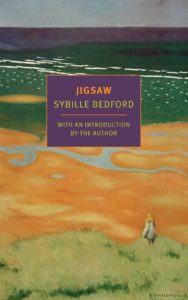
Jigsaw by Sybille Bedford
I came across this book for the first time a few years ago and thought: Really? you can do that… mix truth and fiction in plain sight? Bedford talks about these strategies in the book’s introduction—and there’s even a page of disambiguations up front: the Huxleys are the Huxleys but she and her mother are only “percentages.” Then the book begins with a scene in which the narrator is shushed and left in her perambulator (so: presumably under the age of two?) while her mother carries on in the next room with a boyfriend. Not credible, in so many ways, but she puts it there and I believe it. That close juxtaposition of realism and artifice is something that always grabs me.
Jane Ciabattari: As Bedford noted later, “What I had in mind was to build a novel out of the events and people who had made up, and marked, my early youth…Truth here was an artistic, not moral, requirement…It involved…writing about myself, my feelings, my actions.” Her idea of truth being an artistic, not a moral requirement, is intriguing. Is that part of what was liberating for you?
Rachel Cline: That, but not only that. She also calls Jigsaw “a biographical novel”—not “autobiographical.” That clues the reader that there are counterarguments running throughout the book, that the other perspectives are there, even though she is not voicing them. There’s actually something very moral about that, I think, or at any rate very ethical. The stunning thing is that her seams don’t show. The narration reads as though it is tumbling straight out in the course of an all-night conversation: several times she even starts a paragraph with the reader’s implied question: “How old was she?” “What was it like?” “When did this begin?” Interestingly, the writing is almost all “telling.” There are page-long paragraphs, only occasional wisps of dialog, few actual scenes, and many colorful lists. It should not be a compelling read, by writing workshop standards, but it is. I gobbled it up, on the first read—reading it felt, to me, like inhabiting another person’s life. As an adult, fiction rarely gives me that particular thrill any more.
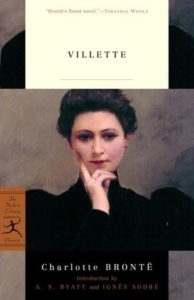
Villette by Charlotte Brontë
This novel contextualized me for myself as a young woman the way Harriet the Spy had done when I was a girl. It described the surround of depression in a way that I recognized viscerally, but it accomplished that psychological truth in a romantic, almost gothic story full of mysterious apparitions and missed chances at love… stuff I was way too cool to take seriously. Yet I think it was that contrast that let me identify so closely with the narrator, Lucy Snowe. Her life could hardly have been more different than mine (or more fictional seeming), but her experience was telling me something deep about who I really was.
JC: Lucy Snowe leaves England for the Belgian village of Villette, to teach, in a journey not unlike that taken by Charlotte and her sister Emily took to Brussels. It’s interesting that Villette, Bronte’s last novel, is a reworking of her first. Do you think that’s an encouraging lesson about revision?
RC: All lessons about revision are encouraging! It’s funny, though, because though I was certainly aware of Villette’s similarities to Jane Eyre when I read it, I would never have called it a “reworking.” Mostly because I don’t recognize Jane’s voice in Lucy’s. From the beginning, Lucy is clearly an observer, even a lurker—in the novel’s first paragraph she tells not about herself but about her godmother. The second paragraph begins, “When I was a girl I went to Bretton about twice a year, and well I liked the visit.”—even her liking is strangely indirect. Her first line of dialog, a page later, is “Of what are these things the signs and tokens?” She’s a weirdo, and in many ways a downer, but she is also a champion noticer and droll describer, and you come to love her for that, for her writerliness. She’s such an intelligent guide that you are willing to stay with her even through periods of tedium, depression, and delusion. She makes you hope on her behalf, despite her own despair. “Let them [her readers] picture union and a happy succeeding life” she says at the end. She doesn’t, however, tell us whether our hopeful picture has any truth to it.
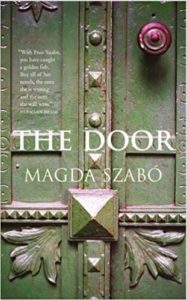
The Door by Magda Szabó
I am not the most open-minded of readers and contemporary novels in translation are often a tough sell for me (Knausgaard and Ferrante, both no… but not for lack of trying!). I can’t remember why I started this one, but once I’d read it, I could not stop thinking about it or pressing it into the hands of other readers. It’s about a prickly relationship between women who are close allies of a sort, but also opaque to one another. It’s about a very specific time and place in Budapest, and a very particular (inimitably so) pair of characters, yet it spoke to me directly. It’s a peculiar book, unlike any other novel I’ve read.
JC: Szabo was highly touted in Hungary when she began publishing in the 1940s. Her second poetry collection won a prestigious award after it was first published in 1949—but then she became an “enemy of the people,” and was forbidden from publishing until 1956. The Door has this strange sense of time, as she describes the intimate feelings a writer has developed in her relationship with her longtime housekeeper. The line “I killed Emerence” is a grabber. How would you explain how Szabo creates the eerie tone? And do you think it is related to the repression in Communist Hungary?
RC: Her ways of describing Emerance do a lot to set the tone: Her face is always hidden by a scarf, but when the writer tries to describe it she says it’s “like a lake,” despite first saying that calling someone’s face lake-like is a comparison that has never made any sense to her. She compares her to a robot, a Valkyrie, and a giant rag doll and she frequently “appears” or “reappears” without ever having approached. She tells us that Emerance almost never sleeps—or even lays down; she has no bed. Early on, she prepares a curative potion for the narrator that sounds like something out of Snow White. And then there are her secrets, the implausibly gothic death of her siblings before the war, the house she won’t let anyone inside of, her ineluctable power over the writer’s dog, who she also abuses terribly—so there are little mysteries and big mysteries. In reading back over what I’ve just written, The Door sounds like a gothic novel, but the narrator’s voice is entirely contemporary and circumspect—someone you might have met at a conference last week.
My answer to your other question, “is it related to the repression in Communist Hungary?” would have to be “yes, but I don’t understand how or why.” The story spans several years—possibly more than ten—and the recent past looms large: the question of whether Emerance’s house contains treasures stolen from a Jewish family is ever-present, as is the generalized memory of shortages and privations—but it could be taking place in the 60s or the 80s, there are no clear signals. We know that the narrator, like Szabo, has until recently been unable to publish and the keenness of her need to be back at work, getting things done, is unstated but palpable throughout the book. She guards her writing time jealously and gets angry when Emerance’s peculiarities interfere with her writing time—these clashes are funny, although also painfully familiar. Anyway, the question of “when IS this?” was a persistent one for me. I suppose a Hungarian reader would know Szabo’s own story and dates and impose those onto the novel, but I ultimately came to appreciate the unknowability of it all.
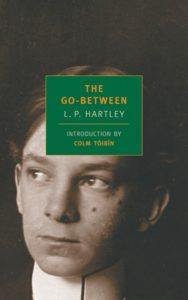
The Go-Between by L. P. Hartley
The famous first sentence, “The past is a foreign country, they do things differently there,” is actually a feint. The narrator knows that country—a few weeks in the summer of 1900—as though he has been embedded there ever since. He sees it all, and his young self in it, with cinematic ease and clarity (probably why this novel made a good movie, with a script by Harold Pinter no less). The story takes off from a supremely corny premise: the narrator coming across a childhood diary in middle age. And, really, many of its plot mechanics should creak like ancient armor—a child’s magic spell that coincidentally achieves its end, a summer holiday at a country estate, the secret letters of assignation that the narrator carries as a feckless young dweeb—but in the telling it is all as vivid and plausible (and thus also implausible) as childhood itself. It has that quality of droll wisdom mixed with rueful hindsight that I have always loved in The Good Soldier.
JC: From midcentury, Hartley’s sixty-something narrator looks back at his boyhood, cued by that diary written in 1900 when he was 12 and coming into an awareness of social class and attractions on a summer visit to a wealthier classmate. It’s an awkward but momentous time. “It was then I began to cherish a dream of becoming a writer—perhaps the greatest writer of the greatest century, the 20th.” It could be corny, as you say, but it ends up memorable. Can you give examples of that droll and rueful tone that makes this novel work so well?
RC: Leo, the narrator, arrives at his friend’s country estate in July with only a woolen suit to wear, and experiences a great deal of cringing discomfort as a result. The grown-ups tease him. Ultimately, he is taken into town by his friend’s crushworthy older sister and outfitted properly. Back at the house party, at tea, he is “made to stand on a chair and revolve like a planet, while everything of my new outfit was subjected to admiring or facetious comment. […] ‘What a cool customer he looks,’ said someone, wittily, ‘Yes,’ said another, ‘and the same shade of green!’ ” Leo concludes, “From being my enemy, the summer had become my friend.” And since I have now explained about the suit, there’s a bit a little further on where Leo supposes that the items of his new wardrobe, “were only my first steps toward a complete corporeal union with the summer.” He then fantasizes about removing them: “one by one, they would be discarded—in what order I couldn’t decide, though it was a question that exercised me.” Hilariously perfect evocation of child-mind! and then “My notions of decency were vague and ill-defined, as were all my ideas relating to sex, yet they were definite enough for me to long for the relief of casting them off with my clothes and being like a tree or flower, with nothing between me and nature.” The self-seriousness of the child’s view, the brittle mockery of the adults, Leo’s simultaneous awareness of the social norms and obliviousness to them—these things are what make this book endlessly re-readable, for me.
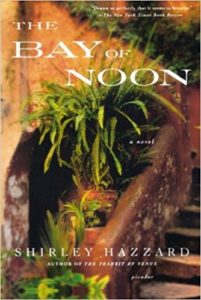
The Bay of Noon by Shirley Hazzard
This book is much less read than The Transit of Venus, but I cannot fathom why. Hazzard here, as there, is incomparably smart and witty: her eye for details of setting and character is a precision instrument; and she has faultless taste as a writer: what words to use, what images to invoke, how long a sentence should last… I would follow her anywhere. In this book, for example, there’s a description of an apartment that goes on for almost three full pages (how is she getting away with this, the small mean voice in the back of my head wanted to know), but she does more than get away with it, she makes you grateful. When I write, I am always trying to tuck descriptions in on the fly, on the way to something plotty, for fear the reader will vanish.
JC: Hazzard is a genius at creating atmospheric evocations of places (Naples!) and moments (“the lilac dress Giocanda wore one morning driving to Caserta”). Do you have favorite passages?
RC: Many! A favorite apercu, also about Gioconda, the slightly older writer who is Jenny, the narrator’s, only friend in Naples: “She clung to these social canons and cyphers as desperately as if she had been raised among anarchists.”
Then there’s this great scene at the ruins in Herculaneum, where Gioconda’s married lover Gianni tries to kiss Jenny: “… his mouth roughly glancing over my chin and throat as I spun my head away, dodging his caress like a blow. He dropped his hands from my shoulders but still stood blocking the way, looking at me and smiling, and repeating in a normal voice, ‘What could be more charming.’
“I stood in the niche where he had placed me. Even to push him away seemed like too much of a response. In an undertone he complained to me, ‘Why the fuss. I am only, so to speak, observing the conventions.’”
Gianni is a film director—that justification of his has a wonderful resonance in the era of #metoo, I think. Anyway, Gioconda photographs this moment without knowing what has immediately preceded it (and I love the way Hazzard’s description gives the time for that to be plausible, without saying how long they stood there). Later, Gioconda shows the photo to Jenny: “There is Gianni, smiling ironically out of the picture at something that has momentarily taken his fancy.”
Finally, here’s a Neapolitan moment—Jenny buys a bunch of roses on the street: “a strong, gritty wind had blown up, and it snatched out of my hand the fragments of change I had been given. The five and ten lire pieces came, then, in wrinkled miniature banknotes instead of coins, and two or three of these wheeled about the footpath creating false opulence around me and giving desperate exercise to a group of urchins with fierce, elderly faces.” When she gets the flowers home, they turn out to be “only the broken heads,” wired to their stems “with such patient professionalism that one seemed almost to have profited from the deception. They lasted a few days, these ironic flowers of Naples, though perhaps as long as any roses in that season.”
As you say, she is a genius.
*
· Previous entries in this series ·

